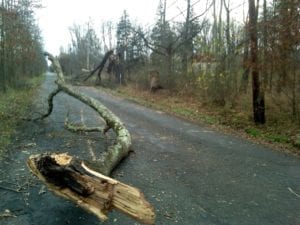Who is a member?
Our members are the local governments of Massachusetts and their elected and appointed leadership.

Severe weather events can cause downed trees, leaving wood debris to be disposed of by municipalities.
Amid changes to recycling markets that are reshaping the way municipalities manage solid waste and recycling, wood debris management has emerged as a related challenge.
Jonathan Parrot, renewable thermal program coordinator for the Department of Energy Resources, explained that a confluence of environmental and market factors has led to an increase in wood debris – and limited options for its sustainable disposal.
A growing rate of severe weather events, and infestations of invasive species such as the emerald ash borer, Asian longhorned beetle, and gypsy moth, have contributed to the problem.
Sturbridge Tree Warden Tom Chamberland, who is also a consulting arborist, made a presentation on the topic at the September meeting of the MMA Policy Committee on Public Works, Transportation, and Public Utilities. Chamberland would like to survey tree wardens and other relevant public works officials across the state to gather data about the wood debris problem and proposed solutions. (Those who wish to participate in the survey, or in discussions about wood debris management, may contact him at tchamberland301@gmail.com.)
Chamberland described many of the challenges to wood debris management, and noted the limited options for proper and environmentally sound disposal.
Environmental regulations govern the quantity and relative location where municipalities can dispose of wood debris in forested areas. There are also limits on the export of infested wood debris across state lines.
Massachusetts has one facility, Pinetree Power in Westminster, that burns wood debris to generate electricity. A second facility, in Springfield, is slated to become operational in 2019.
On a small scale, biomass combustion and modern wood heating are options available to residents, businesses and municipalities. The DOER offers incentives for biomass heating, as well as other renewable energy generation, through its Alternative Portfolio Standard program. Residential, business or municipal customers who use a modern wood heating system may qualify for annual payments from the DOER for heating their home or building using biomass or wood.
The Commonwealth’s Global Warming Solutions Act requires a 25 percent reduction in carbon dioxide emissions by 2020, and an 80 percent reduction by 2050. As one part of a complex plan for reducing statewide emissions, the APS program gives credits to producers of renewable energy sources who help the Commonwealth to meet its goal.
For more information about the APS program, including eligibility and application materials, visit www.mass.gov/alternative-energy-portfolio-standard. Informational videos about the program are presented by the Massachusetts Forest Alliance at www.massforestalliance.net/aps-videos. (The alliance’s Statewide Wood Energy Team will be an exhibitor at the MMA Annual Meeting & Trade Show on Jan. 18 and 19.)
The MMA Policy Committee on Public Works, Transportation, and Public Utilities has prepared a best practice recommendation on developing a sustainable wood debris management plan, which includes a consideration of biomass heating options. The MMA’s fourth Best Practices series will be available on the MMA website in January.